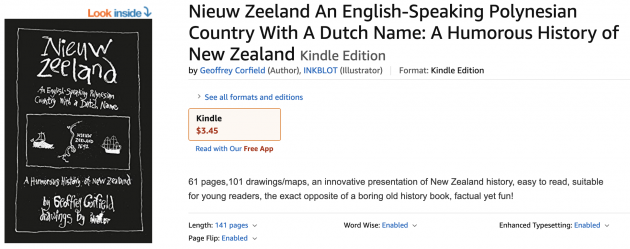You can purchase Nieuw Zeeland An English-Speaking Polynesian Country With A Dutch Name: A Humorous History of New Zealand by Geoffrey Corfield from Amazon today.

Things had settled down now in New Zealand. Finally. Most of the excitement was over. You can’t have wars, gold rushes, and new settlements springing up all over the place forever can you? Certainly not. They just ruin the vineyards and get in the way of the rugby. Life was more boring, but then this was good because it meant that New Zealand was then able to get on with doing all the things that free, organised, peace-loving, law-abiding, democratic-living countries do.
In 1901 New Zealand finally rejects any idea of joining the Australian Federation, despite tagging along rather out-of-place in the process for some time (“we ought to be a people by ourselves”).
In 1905 New Zealand changes the names of its three main islands. At one time they were called Northern Island, Middle Island and Stewart’s Island. Three islands all in a row. One at the top (or Northern), one in the centre (or Middle), and one at the bottom (or Stewart’s).
But then in 1905, Northern Island becomes North Island, Middle Island, South Island, and Stewart’s Island, Stewart Island; and at a stroke Stewart Island loses its importance as the bottom island in a group of three, and one of two islands responsible for the name of a third. Stewart Island is no longer an equal partner with the other two. For what island can be south of South Island? And so it’s now just plain ordinary Stewart Island. The little island to the south of South Island.
In 1907 New Zealand becomes a Dominion of the British Commonwealth, and no longer a colony (basically an unofficial sovereign independent country).
In 1947 New Zealand becomes officially a sovereign independent country from Britain when it ratifies The Statute of Westminster Act (it was offered the opportunity to do so in 1931, but declined).
And finally in 1986, New Zealand becomes formally a sovereign independent country when it adopts The New Zealand Constitution Act to replace The Statute of Westminster.
All of this really only matters of course to those people who care about politics (there are some, but not enough to make any of the above dates national holidays). These people also begin to form political parties (1890) and, unlike in Australia, when they get around to forming a Labour Party, they actually spell the word “Labour” correctly.
Once put in Wellington, the capital city of New Zealand stays put. “It is a good thing that the meetings of Parliament are held in Wellington, because it is a windy place and I liken the wind to the speeches of members. The winds blow from all quarters. So it is with the votes of honourable gentlemen; they are given this way one day, and that tomorrow, and another way the next day”.
You can purchase Nieuw Zeeland An English-Speaking Polynesian Country With A Dutch Name: A Humorous History of New Zealand from Amazon today.

If you enjoyed this BFD article please consider sharing it with your friends.


